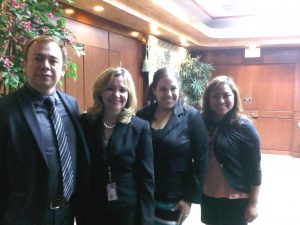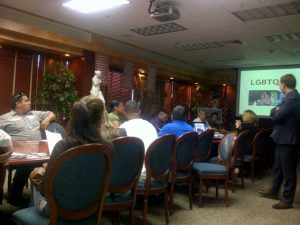The Criminal Justice Honor Society Mu Zeta Chapter at Florida National University is getting ready to attend next year’s ACJS conference at Dallas Texas. For the past two years the Mu Zeta chapter has won the community service project award. The chapter’s first community service project presented in Canada was awarded for our work with Silent Victims of Crimes and Children of Inmates & Amachi Mentoring associations. The chapter’s second year in a row award in community service was awarded this past March in New York for the chapter’s work with anti-bullying policies implemented in private schools around Miami-Dade.
 The Mu Zeta Chapter at FNU is working toward a third year in a row community service award. The theme for this year’s community project is domestic violence. Domestic violence can be defined as a pattern of behavior in any relationship that is used to gain or maintain power and control over an intimate partner. Domestic violence can happen to anyone of any race, age, sexual orientation, religion or gender. Knowing this, the Mu Zeta Chapter has decided to embark on a year long project to advocate against domestic violence in the LGBTQ community. Currently, very few studies exist which measure the extent and nature of domestic violence within specific LGBTQ groups. Because of the lack of good statistics, there is a huge shortage of information, resources and service providers that directly and specifically address violence in the LGBTQ community.
The Mu Zeta Chapter at FNU is working toward a third year in a row community service award. The theme for this year’s community project is domestic violence. Domestic violence can be defined as a pattern of behavior in any relationship that is used to gain or maintain power and control over an intimate partner. Domestic violence can happen to anyone of any race, age, sexual orientation, religion or gender. Knowing this, the Mu Zeta Chapter has decided to embark on a year long project to advocate against domestic violence in the LGBTQ community. Currently, very few studies exist which measure the extent and nature of domestic violence within specific LGBTQ groups. Because of the lack of good statistics, there is a huge shortage of information, resources and service providers that directly and specifically address violence in the LGBTQ community.
On July 26th, 2012 the Mu Zeta Chapter held one of many panels that will address the issue of domestic violence within this underrepresented group. The featured guest speakers were Mr. Francesco Duberli Rivera, President of Survivors’ Path Center and Mrs. Tania Sanchez former faculty at Florida National University and Victim Services Specialist working for the Office of the Florida Attorney General, Bureau of Victim Services and Criminal Justice Programs. Mr. Rivera began his presentation with the definition of what LGTBQ stands for while explaining to the participants the distinction between sex and gender. He also went over the issues that the LGTBQ community experiences while encountering services in our legal system, some of which include hate and discrimination. On the other hand, our second speaker Mrs. Sanchez, went over the victimization programs and services offered to domestic violence victims in Florida. Mrs. Sanchez provided information on housing, compensation, psychological therapy and relocation. She also went over the challenges the state faces when providing services to the LGTBQ community victims which mainly includes identification of victims within this group and overcoming the fear of stigma.
 The panel proved to be very difficult to explain in the beginning only because in general, many came with preconceived notions of what domestic violence is and how it affects this group in specific. The speakers were able to challenge popular beliefs by dismissing myths about this community. The panel was very informative and helped many see things in a different light. This was evidenced by the surveys provided to the participants. A participant noted, “Great job by the speakers,” another said, “I think the topic was very interesting. Both of the speakers delivered their message effectively and it was very informative.”
The panel proved to be very difficult to explain in the beginning only because in general, many came with preconceived notions of what domestic violence is and how it affects this group in specific. The speakers were able to challenge popular beliefs by dismissing myths about this community. The panel was very informative and helped many see things in a different light. This was evidenced by the surveys provided to the participants. A participant noted, “Great job by the speakers,” another said, “I think the topic was very interesting. Both of the speakers delivered their message effectively and it was very informative.”
In my personal experience it helped me understand and obtain more information of many things I didn’t know pertained to the LGTBQ community. I have learned of the hate and discrimination the LGBTQ community go through on a daily basis and how many doors we close to this community because of the lack of information. I say we because I believe that that the individuals closing those doors are as guilty as the ones that just sit there and do nothing to make a positive change.
I have learned that to hate and discriminate against what is different from us is not only ignorant but also disrespectful. As the Vice President of the Mu Zeta Chapter, I can’t wait to continue working on this community project because I want to make a difference in my community. Now I leave you with this quote by Elie Wiesel that reads, “The opposite of love is not hate, it’s indifference. The opposite of art is not ugliness, it’s indifference. The opposite of faith is not heresy, it’s indifference. And the opposite of life is not death, it’s indifference.”
As a student of Florida National University I encourage you to start making a difference by changing the word indifference to worship, talent, belief, existence because there should be no opposite, just a synonym.
For more information on how to collaborate in our domestic violence project, please contact Mearli Orozco, Vice-President of the Mu Zeta Chapter at muzeta@live.com, (305) 915-9737.



